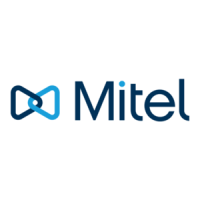Migration
10
• Platform Migration
• Migration Tool
• Migration from Pre-9.0 MiVoice Business Platform to SMB Controller
• Migrating Embedded Application to offboard
10.1 Platform Migration
The SMB Controller does not share common cards with other platforms. The MiVoice Business
on the SMB Controller will only support the 4 port FXO expansion, 2 port FXS expansion, and 4
port FXS expansion cards
This means that cards supported on one platform type are not supported on another platform
type. These devices do not consume any licenses during the database restore process and can
be converted back to analog devices after the database restore has completed. After the device
has been modified, converted to analog, or when the SIP device starts using this DN, a license is
consumed.
When migrating MXe III, CX II, and AX Controllers, the platform-specific hardware (AMB/AOB,
CIM, ASUs, T1/E1, Dual T1/E1, and so on) are not supported on the SMB Controller and will
be ignored. Analog Devices connected to this hardware are converted to PENDING Single Line
Generic SIP Devices. Analog Trunks are removed, leaving an ARS Route pointing to an empty
Analog Trunk Group. To restore functionality, the Administrator must make the required changes.
Note:
The type *.dr.logfile_1 Maintenance Command can be used to dump the Call Control Restore
Logs to see what data was dumped and why.
Note:
The SMB Controller can support up to 16 Voicemail ports. If the migration of a
database contains more Voicemail ports than is supported on the SMB Controller,
it will be reduced to 16. If there are not enough DSPs to support this configuration,
DSP alarms will be raised.
Document Version 1.0
System Manual for Mitel SMB Controller 159

